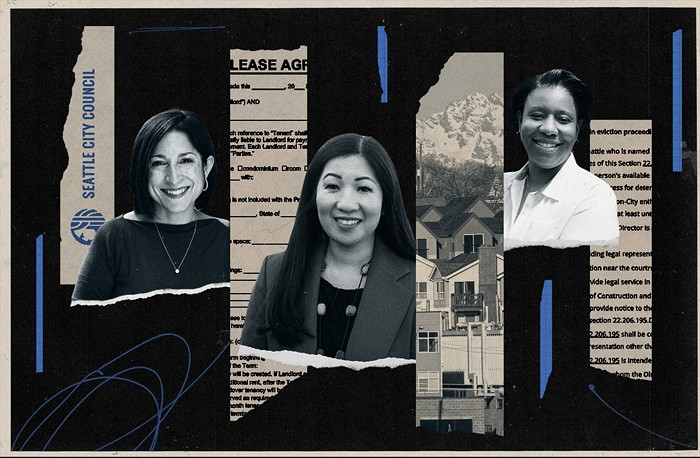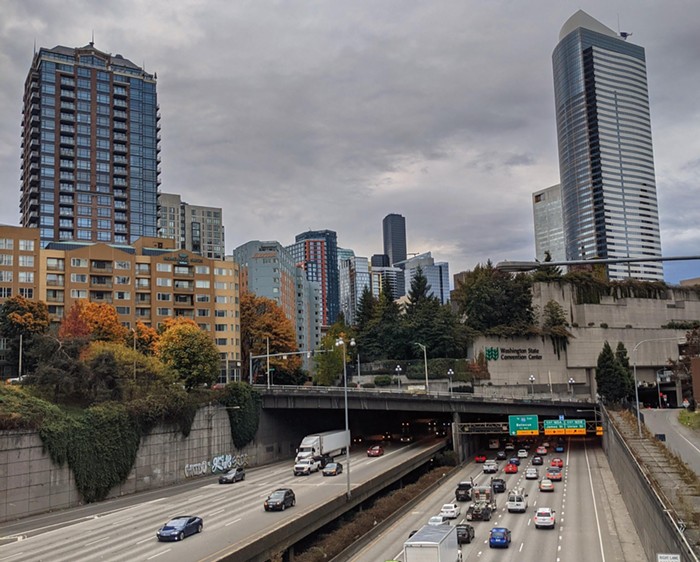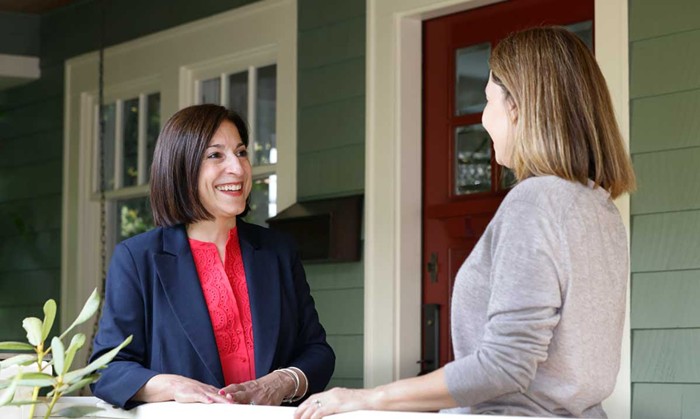
For the past 28 years, the best bar on the Ave has been Flowers Bar and Restaurant.
This location was once a flower shop that ultimately ran out of business and remained empty for a few years. Then, in 1992, Fadi Hamade transformed the abandoned space into a mirage of Lebanese cosmopolitanism that served cheap drinks and featured a Mediterranean menu. Hamade wisely kept the sign and part of the name of the former business. The sign is now an Ave icon, and it functions as a kind of gateway to what some call Little Lebanon. Here, Hamade's Flowers shares a little street with Cedars of Lebanon, and Samir's Mediterranean Grill Lebanese Cuisine. The former opened in 1975 and the latter in 2005. Flowers is also great for indoor and outdoor people-watching. And in the mid-90s it was something of a court for an obscure Pakistani poet named Wajahat Malik. He left town after 9/11.

Today, Little Lebanon's street is all torn up because of construction related to the U District Link Light Rail station at Brooklyn Ave NE and NE 43rd Street. This station, which is set to open in the fall of 2021, will neighbor the building that houses Samir's Mediterranean Grill. The Seattle Department of Transportation plans to build a pedestrian friendly corridor between the station and the University of Washington, which means the businesses of Little Lebanon will have to endure more blows to the only thing that keeps them going: profits. Of course, other profit-eaters include the pandemic, the slow recovery from the lockdown, and the University's shift to online courses.
On August 6, the UW decided to conduct 90% of its classes online, and because the pandemic will not be over by fall, we can expect this policy to continue in 2021. Little Lebanon may not see anything like normal business until around the time the UW Station opens.
"Let me tell you one thing," Hamade said to me as he made the second whisky sour I ordered, "It has been for me very hard. Very, very, hard." It was a late summer Sunday. The business had a few drinkers and diners. The same old woman with the same cocktail was still in the same spot I've always found her in since Flowers first opened. I also noticed that Hamade was doing the cooking and the bartending. One waiter served the tables. And above it all was the glorious ceiling mirror that doubled the bar, the food, the booze, the people. I overheard one young woman, who was sitting with a tall sporty man wearing a UW basketball jersey, say: "I got Covid. I did it. It's over."
But to be fair, the Ave has probably had the longest decline in Seattle history. Even when I first made an appearance here in the early 1990s, the area had been going to the dogs for almost forever. What was then already an endangered species was a business owner who did not moan and groan about the decline, the diminishing sales, the death of the good times, and the ever-growing population of "Ave rats"—young people on skateboards, young people begging for money, young people playing their music too loud, young people wondering where they were going to sleep that night.
Typical is the mood expressed in the article published in 1995 by the University of Washington Magazine: "The Fall (and Rise?) of the 'Ave.' Once Seattle's Second Main Street, the Ave. Has Fallen on Hard Times. Can the UW and Local Community Save What's Left?"
What is wrong with the Ave? Of course, it was once a thriving place, back at the turn of the previous century ("Set up by Seattle's pioneers as the city's second main street before the turn of the century...."). But somehow the street lost its way ("...University Way NE today sadly bears little resemblance to its old self."), and anchor businesses like "Nordstrom, JC Penney, The Limited and Athlete's Foot" up and left. Even the Ave's funeral home shut its doors to the dead. The big money-makers moved to "Northgate Mall or University Village," and all that was left was "sky-high leases, a flood of street people and lagging sales."
This dark mood of the moment was worsened by the crash of 2008, and was not much improved by the boom period between 2013 and 2019. During that boom, however, a number of small and big businesses actually opened on the Ave. There is the Asian grocery store Le Mart, and the Target, and a CVS Pharmacy, which is now in the building vacated by Nordstrom ages ago. Also, a bunch of very old businesses are still in business. There's Nasai Teriyaki, the shoe store Woolly Mammoth, the bar Big Time Brewery, and, most amazing of all, Bulldog Newsstand and Cafe. Indeed, I can recall Bulldog's owner complaining in 1991 about how bad things were. This was long before the internet revolution. This was still a time when people bought magazines in the way they now visit websites. Bulldog has survived all that. A bunch of video stores and, of course, Tower Records, cannot say the same.
The Ave has never really stopped changing. In 2008, for example, a new and almost fancy apartment building appeared on 4730 University Way. It's named after Lothlórien, an enchanted elven forest located west of "the Misty Mountains, with the Dwarf-realm of Moria" and east of "the great river Anduin" in the Middle-earth. (Though the inspiration for the building's name is attributed to one of the developers' mothers, who was a librarian, it is important to keep in mind that The Lord of the Rings was to the first decade of the 21st century what the Game of Thrones was to the second.) Roger Newell, the architect of this "ancient forest of elves" made sure that it looked a little like the old and noble Wilsonian, which sat adjacent to it. That building, constructed in 1923, was once "advertised as the most elegant apartment hotel outside of New York City."
And now for a quick digression to the first year of the 1990s: I once brought to the Wilsonian a backpack filled with reggae tapes to a third-floor apartment occupied by Jeffrey Ament. He was then the bass player for Mother Love Bone, the band that eventually became Pearl Jam after the death of its lead singer Andrew Wood. Ament had learned from a friend we had in common, another musician named Kristen Barry, that I was something of a reggae expert. (I was more into hiphop, but had accumulated a knowledge of dancehall and dub tunes because toasters and versionists formed the foundation of hiphop.) Ament wanted to learn more about reggae, and I agreed to share with him what I knew about the music. And so, on a late-winter day, I buzzed into the Wilsonian, went up the elevator, knocked on the door on the third floor, entered the apartment (which had almost no furniture), and began my first and only lesson with this instruction: Stay away from Bob Marley for as long as you can.
Let's return to the pandemic-era Ave.

What cannot be doubted at this time is that, due to the lockdown crash of March 2020, most, if not all, of the businesses here have a bottom line that's under an unusual amount of stress. The Varsity Theater, a much-loved cinema house, is in pandemic purgatory and even has bushes flourishing on its facade. Worst of all, the College Inn Pub and all of its ghosts, such as the late local literary figure Amber Curtis, have been permanently closed to the world, though Hamade believes someone with capital will eventually buy it and bring it back to life. The economic packages for small businesses at the national and local levels have not matched the reality and extent of the ongoing catastrophe. The reason why Wall Street is doing so well these days is because the Fed is pumping into it the kind of liquidity that businesses on the Ave and other university towns really need to survive what will certainly be another year of sales that are doing much worse than lagging.
How can the city help? A walk down the Ave will show that the businesses here don't have access to the sidewalks, which are narrow and heavily trafficked. As a consequence, not a single bar or restaurant has outdoor seating. In fact, the only outdoor place to sit is weirdly in front of the Bulldog Newsstand. But anyone who does not see Trump as the best thing ever since Jesus knows that outdoor dining and drinking is the way to go during the pandemic, which is far from over.
What to do if you are an urban planner with some power (and your name is the same as the country I'm from)? Close the main section of the Ave—from NE 47th Street to NE 41st Street—to cars and buses, and replace them with freely walking people and seating areas for businesses. Because it is almost impossible to find parking on the Ave during peak hours, no business would be lost by the removed car traffic. Furthermore, a pedestrian-centered street would not only be safer for students but would likely attract people from outside of the UW community.
In the midst of Seattle's boarded-up downtown, here comes @pike_place springing back to life. cc @jontalton @seattlesketcher https://t.co/WQs810QNZo
— Mike Lindblom (@MikeLindblom) August 31, 2020
What is now finally working for Pike Place Market (fuck off cars!), will certainly work for the ever-declining but always wonderful Ave.



















